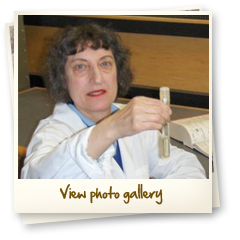

I am originally from Czechoslovakia . In high school I took chemistry, biology, physics and math so, I was prepared to take some biology and geology courses in university when I came to Canada. I was one of the first female students to pursue a career in the field of geology. I also have a degree in biology. These two degrees allowed me to do environmental biology/geology.
In environmental biology/geology, you use electron microscopes to see small grains in rocks and into bacteria where you can see crystals inside bacteria cells. Imagine looking inside of something you cannot see with your own eyes. A sand grain under an electron microscope looks like thousands of miniature pin heads. When I first looked at these things under the microscope, I was hooked on the study of microbes, plants, animals and geology and how they all interacted.
One of the first projects I worked on was in researching why ore trucks were getting stuck in a newly constructed gravel road after it rained. It turned out that rocks used in the road construction were contaminated with bacteria and each time it rained the bacteria grew causing it to act like a sponge which separated the gravel and caused the trucks to sink.
Yellowstone National Park, Wyoming USA was a highlight for me. There were geysers (hot water shooting into the air), pools of water containing different chemicals leading to the growth of microorganisms, rock terraces (like waterfalls) made of white calcium carbonate.
My company Micro Earth Environmental researches environmental issues relating to the oil and gas industry as well as other environmental concerns.
I also teach at university and supervise students who are studying in the field of geology and biology. As a member of the Geological Association of Canada, I volunteer my time by instructing teachers who want to increase their knowledge of a particular field of science.
As a professional geologist you join the Geological Association of Canada. This allows you to be involved with others in the field and go to conferences on a regular basis.
I am proud to have accomplished so much as a female in the field and I am happy to share my knowledge with young students.
 Q: What is the title of your job and what do you do?
Q: What is the title of your job and what do you do?A: Researcher, Director and Lecturer
A: Dalhousie University. Micro Earth Environmental Consulting Company
A: The hours vary depending on the research or type of work. Hours could be any where from 8 to 15 per day.
A: Office, laboratory, classroom, field study in different climates which can be in other parts of the world.
A: Geological hammer, sieves, ladles, geological core sampler, different microscopes, experiment glassware.

A: Master of Science and PhD. (combination of biology/geology)
A: Extremely observant, patient, meticulous, passion for the field, good people skills, like to travel.
A: 50, 000 and up depending on the contract.
A: Using all the knowledge I have learned and the possibility of discovering new things and interacting with others who share similar interests.
 Q: What are the advantages?
Q: What are the advantages?A: Diversity of work environment. In the spring, summer and fall you travel and collect samples. In the winter you work in the lab and office and lecture.
A: Opportunities will depend on your knowledge base, so continuous learning is recommended. When you are established you can choose projects you like so that you can challenge yourself to grow in your field.
A: You need to be patient and be able to sit for long periods of time when observing samples under the microscope.
A: I was interested in science. Rocks, plants and animals made me very curious and I wanted to know more about what they were made of and how they worked in the environment.

A: Yellowstone National Park, Wyoming, USA. Geysers and Terraces of calcium carbonate. Working on pieces from RMS Titanic and discovering a new bacteria with other scientists.
A: Challenge your self, take different courses in different fields to understand how things in science work together. Geology is the basis for all other fields of science.
A: It doesn't matter where we go (space, ocean floor, another country or another province/state) the Earth is the source of the materials we use to get there (oil, gas, metals, diamonds, and food).